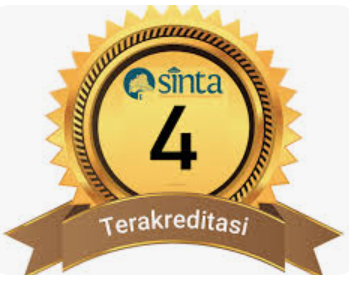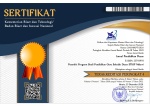ANALISIS KESIAPAN ORANG TUA MENDAMPINGI ANAK USIA SEKOLAH DASAR DALAM PEMBELAJARAN JARAK JAUH SELAMA MASA PANDEMI COVID-19
DOI:
https://doi.org/10.46368/jpd.v9i2.459Abstract
References
Aguilar, S. J., Galperin, H., Baek, C., & Gonzalez, E. (2020). When school comes home: How low-income families are adapting to distance learning (Issue October). https://doi.org/10.35542/osf.io/su8wk
Akrofi, O. (2020). Academic Achievement of Primary School Pupils: Investigating Home Environment Factors Contributing to Low Academic Performance. E-Journal of Humanities, Arts and Social Sciences, 1(1), 49–57. https://doi.org/10.38159/ehass.2020061
Alea, L. A., Fabrea, M. F., Roldan, R. D. A., & Farooqi, A. Z. (2020). Teachers’ Covid -19 Awareness, Distance Learning Education Experiences and Perceptions towards Institutional Readiness and Challenges. International Journal of Learning, Teaching and Educational Research, 19(6), 127–144. https://doi.org/10.26803/ijlter.19.6.8
Amanor-Mfoafo, N. K., Akrofi, O., Edonu, K. K., & Dowuona, E. N. (2020). Investigating The E-Learning Readiness Of Ghanaian Parents During Covid-19. European Journal of Education Studies, 7(10), 39–56. https://doi.org/10.46827/ejes.v7i10.3275
Bhamani, S., Makhdoom, A. Z., Bharuchi, V., Ali, N., Kaleem, S., & Ahmed, D. (2020). Home Learning in Times of COVID : Experiences of Parents. Journal of Education and Educational Development, 7(1), 9–26. https://doi.org/10.22555/joeed.v7i1.3260
Brom, C., Lukavský, J., Greger, D., Hannemann, T., & Straková, J. (2020). Mandatory Home Education During the COVID-19 Lockdown in the Czech Republic : A Rapid Survey of 1st-9th Graders ’ Parents. Journal Frontiers in Education, 5(July), 1–8. https://doi.org/10.3389/feduc.2020.00103
Camarero-Figuerola, M., Dueñas, J.-M., & Renta-Davids, A.-I. (2020). The Relationship Between Family Involvement and Academic Variables: A Systematic Review. Research in Social Sciences and Technology, 5(2), 57–71. https://doi.org/10.46303/ressat.05.02.4
Campbell, A. K., Povey, J., Hancock, K. J., Mitrou, F., & Haynes, M. (2017). Parents’ Interest in Their Child’s Education and Children’s Outcomes in Adolescence and Adulthood : Does Gender Matter? International Journal of Educational Research, 85, 131–147. https://doi.org/10.1016/j.ijer.2017.07.010
Chen, Q., Kong, Y., Gao, W., & Mo, L. (2018). Effects of Socioeconomic Status, Parent–Child Relationship, and Learning Motivation on Reading Ability. Frontiers in Psychology, 9: 1297, 1–12. https://doi.org/10.3389/fpsyg.2018.01297
Daniela, L., Rubene, Z., & Rudolfa, A. (2021). Parents’ Perspectives on Remote Learning in the Pandemic Context. Sustainability, 13, 1–12. https://doi.org/10.3390/su13073640
David, M. E., Ball, S. J., Davies, J., & Reay, D. (2003). Gender Issues in Parental Involvement in Student Choices of Higher Education. Gender and Education ISSN:, 15(1), 21–36. https://doi.org/10.1080/0954025032000042121
Duan, W., Guan, Y., & Bu, H. (2018). The Effect of Parental Involvement and Socioeconomic Status on Junior School Students’ Academic Achievement and School Behavior in China. Frontiers in Psychology, 9, 1–8. https://doi.org/10.3389/fpsyg.2018.00952
Fontanesi, L., Marchetti, D., Mazza, C., Di Giandomenico, S., Roma, P., & Verrocchio, M. C. (2020). The Effect of the COVID-19 Lockdown on Parents: A Call to Adopt Urgent Measures. Psychological Trauma: Theory, Research, Practice, and Policy, 12(S1), S79–S81. https://doi.org/10.1037/tra0000672
Garbe, A., Ogurlu, U., Logan, N., & Cook, P. (2020a). COVID-19 and Remote Learning : Experiences of Parents with Children during the Pandemic. American Journal of Qualitative Research, 4(3), 45–65. https://doi.org/10.29333/ajqr/8471
Garbe, A., Ogurlu, U., Logan, N., & Cook, P. (2020b). COVID-19 and Remote Learning: Experiences of Parents With Children During the Pandemic. American Journal of Qualitative Research, 4(3), 45–65. https://doi.org/10.29333/ajqr/8471
Griffith, A. K. (2020). Parental Burnout and Child Maltreatment During the COVID-19 Pandemic. Journal of Family Violence. https://doi.org/10.1007/s10896-020-00172-2
Hamaidi, D. A., Arouri, Y. M., Noufal, R. K., & Aldrou, I. T. (2021). Parents’ Perceptions of Their Children’s Experiences With Distance Learning During the COVID-19 Pandemic. International Review of Research in Open and Distributed Learning, 22(2), 224–241. https://doi.org/10.19173/irrodl.v22i2.5154
Husain, B., Kofia, M. I., Basri, M., & Mahmud, N. (2020). Parents’ Perception on Implementing E-Learning During New Normal Era At Rural School. Jurnal IKA: Ikatan Alumni PGSD UNARS, 8(2), 429–439. https://doi.org/10.36841/pgsdunars.v8i2.845
Iftitah, S. L., & Anawaty, M. F. (2020). Peran Orang Tua Dalam Mendampingi Anak Di Rumah Selama Pandemi Covid-19. JCE (Journal of Childhood Education), 4(2), 71–81. https://doi.org/10.30736/jce.v4i2.256
Jónsdóttir, K., Björnsdóttir, A., & Bæck, U. K. (2017). Influential Factors Behind Parents’ General Satisfaction with Compulsory Schools in Iceland. Nordic Journal of Studies in Educational Policy, 3(2), 155–164. https://doi.org/10.1080/20020317.2017.1347012
Kusaeri, Aditomo, A., Ridho, A., & Fuad, A. Z. (2018). Socioeconomic Status, Parental Involvement in Learning and Student’s Mathematics Achievement in Indonesian Senior High School. Cakrawala Pendidikan, XXXVII(3), 333–344. https://doi.org/10.21831/cp.v38i3.21100
Lau, E. Y. H., & Lee, K. (2021). Parents’ Views on Young Children’s Distance Learning and Screen Time During COVID-19 Class Suspension in Hong Kong. Early Education and Development, 32(6), 863–880. https://doi.org/10.1080/10409289.2020.1843925
Lembaga Penduduk dan Pembangunan Keluarga Negara. (2020). Parental Involvement In Children’s Home-Based Learning (HBL). http://familyrepository.lppkn.gov.my/801/1/INFOGRAPHIC PARENTS INVOLVEMENT IN CHILDREN%27S HBL.pdf
Li, Z., & Qiu, Z. (2018). How does family background affect children’s educational achievement? Evidence from Contemporary China. Journal of Chinese Sociology, 5(13), 1–21. https://doi.org/10.1186/s40711-018-0083-8
Manz, P. H., Gernhart, A. L., Bracaliello, C. B., Pressimone, V. J., & Eisenberg, R. A. (2015). Preliminary Development of the Parent Involvement in Early Learning Scale for Low-Income Families Enrolled in a Child- Development-Focused Home Visiting Program. Journal of Early Intervention, 36(3), 171–191.
Miles, M. B., & Huberman, A. M. (1992). Analisis Data Kualitatif : Buku Sumber Tentang Metode-Metode Baru (T. Rohendi & Mulyarto (eds.); 1st ed.). Universitas Indonesia Press.
Öçal, T., Halmatov, M., & Ata, S. (2021). Distance education in COVID‑19 pandemic: An evaluation of parent’s, child’s and teacher’s competences. Education and Information Technologies. https://doi.org/10.1007/s10639-021-10551-x
Pant, K. R. (2020). Influences of Parental Socio-Economic Status on Academic Achievement : A Case Study of Rural Communities in Kailali, Nepal. Contemporary Research: An Interdisciplinary Academic Journal, 4(1), 95–109. www.craiaj.com
Pantan, F., & Benyamin, P. I. (2020). Peran Keluarga dalam Pendidikan Anak pada Masa Pandemi Covid-19. Kharismata: Jurnal Teologi Pantekosta, 3(1), 13–24. https://doi.org/10.47167/kharis.v3i1.43 Abstract
Phan, T. T. N., & Dang, L. T. T. (2017). Teacher Readiness for Online Teaching: A Critical Review. IJODeL: International Journal Open Distance E-Learn, 3(1), 1–16.
Putri, D. P. K., & Lestari, S. (2015). Pembagian Peran Rumah Tangga Pada Pasangan Suami Istri Jawa. Humaniora, 16(1), 72–85. https://doi.org/10.23917/humaniora.v16i1.1523
Ramadiani, Azainil, Khairina, D. M., & Jundillah, M. L. (2021). Factors Affecting The Failure and The Success of Online Learning In Samarinda. Educational Administration Research and Review, 5(1). https://doi.org/10.17509/earr.v5i1.35883
Ribeiro, L. M., Cunha, R. S., Silva, M. C. A. e, Carvalho, M., & Vital, M. L. (2021). Parental Involvement during Pandemic Times : Challenges and Opportunities. Education Sciences, 11(6), 1–17. https://doi.org/10.3390/educsci11060302
Sari, D. K., & Maningtyas, R. T. (2020). Parents ’ Involvement in Distance Learning During the Covid-19 Pandemic. Proceedings of the 2nd Early Childhood and Primary Childhood Education, 487, 94–97.
Sewang, A., & Aswad, M. (2021). The Readiness of Learning Processes during the New Normal Era of the Covid-19 Pandemic. Indonesian Research Journal in Education, 5(1), 279–292.
Sonnenschein, S., & Stites, M. L. (2021). The Effects of COVID-19 on Young Children’s and Their Parents’ Activities at Home. Early Education and Development, 32(6), 789–793. https://doi.org/10.1080/10409289.2021.1953311
Thomson, S. (2018). Achievement at School and Socioeconomic Background—An Educational Perspective. Npj Science of Learning, 3, 5. https://doi.org/10.1038/s41539-018-0022-0
Ulia, N., & Kusmaryono, I. (2021). Mathematical disposition of students’, teachers , and parents in distance learning : A survey. Premiere Educandum: Jurnal Pendidikan Dasar Dan Pembelajaran, 11(1), 147–159. https://doi.org/10.25273/pe.v11i1.8869
Ventayen, R. J. M. (2016). Teachers’ Readiness in Online Teaching Environmen : A Case of Department of Education Teachers. Journal of Education, Management and Social Sciences, 2(1), 94–106.
Yoenanto, N. H. (2020). Kesiapan Orangtua Menjadi “Guru†di Rumah. Fakultas Psikologi Universitas Airlangga. https://psikologi.unair.ac.id/wp-content/uploads/2020/05/13-Kesiapan-Orangtua-Menjadi-‘Guru’-di-Rumah.pdf
Zhang, C., Qiu, W., Li, H., Li, J., Zhang, L., Li, X., & Li, J. (2021). Parental Stress and Home Activities for Young Children during the Stay-at-home Quarantine Time in China. Early Education and Development, 32(6), 843–862. https://doi.org/10.1080/10409289.2021.1949561
Downloads
Published
How to Cite
Issue
Section
Citation Check
License
Authors who publish with this journal agree to the following terms:
- Authors retain copyright and grant the journal right of first publication with the work simultaneously licensed under a Creative Commons Attribution-ShareAlike 4.0 International License. that allows others to share the work with an acknowledgment of the work's authorship and initial publication in this journal.
- Authors are able to enter into separate, additional contractual arrangements for the non-exclusive distribution of the journal's published version of the work (e.g., post it to an institutional repository or publish it in a book), with an acknowledgment of its initial publication in this journal.
- Authors are permitted and encouraged to post their work online (e.g., in institutional repositories or on their website) prior to and during the submission process, as it can lead to productive exchanges, as well as earlier and greater citation of published work (See The Effect of Open Access).








